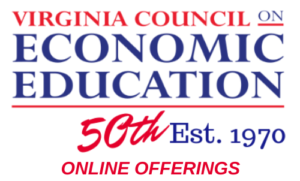Virginia Tech Center for Economic Education
Jul 27, 2020 - Aug 07, 2020
All Day
Grade Level: Grade 3, Grade 4, Grade 5, High School, Middle School
Potential Recertification Credits: 23 Part A (23 hours) and Part B (22 hours)
Developing the entrepreneurial mindset (e.g., opportunity recognition, creativity, innovation, critical thinking, design thinking, problem-solving, communication, and collaboration) in students prepares them for higher education and any career field as well as civic and personal life while allowing them to pursue their interests, abilities, and passions in the new Gig Economy. Entrepreneurial skills are 21st century skills that advance Virginia’s 5 C’s and Profile of a Graduate learning objectives by optimizing engagement and unleashing student potential using inquiry, performance, and project-based instruction to deepen learning across grades and subjects.
While not all students will choose an entrepreneurship career path, students will have skills to become better employees (intrapreneurship) and change agents in their communities (social entrepreneurship). Moreover, research suggests that entrepreneurship education is a real “game-changer” for students, especially those in impoverished rural and urban areas, because it develops self-efficacy, internal locus of control, self-regulation, intrinsic motivation, growth mindset, empathy, resourcefulness, resiliency, calculated risk-taking, and agency. Communities thrive when its members are equipped to offer business-centered solutions to satisfy unmet community needs. Responding to the unprecedented challenges of COVID 19 is a perfect example of America’s necessary entrepreneurial mindset.
This two-week, 23-hour online Institute is mostly self-paced with several synchronous Zoom meetings (dates TBA), including local entrepreneurs who will share “lessons learned.” No background knowledge in business required! The Institute “textbook” will be some of the latest and greatest online, free, real-world, entrepreneurship resources (e.g., articles, videos, lessons, etc.) organized into modules around introductory topics such as types of entrepreneurship, entrepreneurial mindset skills, famous entrepreneurs, design-thinking, concept development, and economic and market principles. The overarching Institute goal is to streamline teacher learning of basic entrepreneurship content and pedagogy by reviewing instructional resources that can be easily and quickly customized for the students and subjects they teach.
Each teacher will decide what culminating project (e.g., classroom-ready PPT slides or activities) they will create and share with other Institute participants for a collection of teacher-created instructional resources. While this Institute is geared toward middle and high school teachers, elementary school teachers are also invited to strengthen their entrepreneurship content knowledge and instructional practices.
Online Entrepreneurship Institute (Part B): Business Plan is optional and offered in Fall or Spring 2020-21 (dates TBA) for an additional 22 recertification hours. Topics will be more technical and in-depth, such as financial statements, funding sources, business plans, and elevator pitches. Teachers who complete Part A and Part B will receive Virtual Economics 5.0 ($160 value) and earn the “VCEE Certified Entrepreneurship Educator” credential upon passing a post-test.
Fee: NO CHARGE
Instructor: Dr. Cheryl A. Ayers
Contact Person:
Dr. Cheryl A. Ayers
Center for Economic Education
Virginia Tech
434-258-2380
cheryl42@vt.edu
Register for Online Entrepreneurship Institute (Part A): Entrepreneurial Mindset
Registration is closed for this workshop.
By registering for this workshop, I agree to allow photography to be taken during the program and used by VCEE or affiliated Centers in their print materials or electronic images.
Our privacy policy: We will not sell or release this information to any party other than VCEE, an affiliated center for economic education, and, on occasion, the Council for Economic Education. In all cases, it will only be used to promote economic and financial education and provide you information about programs and resources supporting this education.


